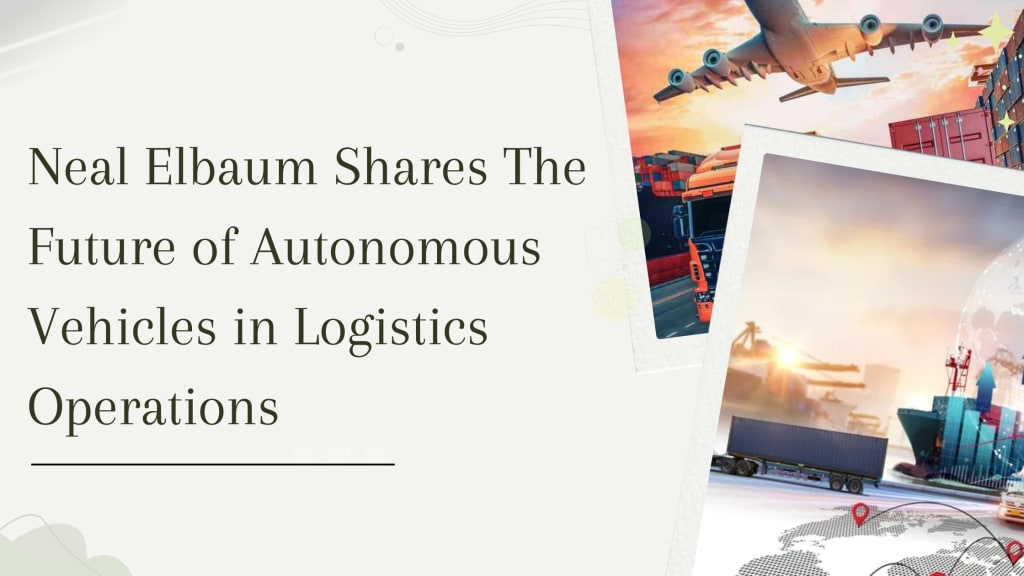Neal Elbaum Shares The Future of Autonomous Vehicles in Logistics Operations
The integration of autonomous vehicles in logistics operations represents a paradigm shift that promises to redefine the way goods are transported and distributed.

In the ever-evolving landscape of logistics operations, the integration of autonomous vehicles has emerged as a transformative force, promising enhanced efficiency, cost-effectiveness, and safety. As technology continues to advance, industry leaders like Neal Elbaum are at the forefront, shaping the trajectory of autonomous vehicles in logistics. In this article, we delve into the insights shared by Neal Elbaum on the future of autonomous vehicles in logistics operations.
Introduction to Autonomous Vehicles in Logistics
Autonomous vehicles, ranging from self-driving trucks to drones, have garnered significant attention for their potential to revolutionize the logistics industry. With the ability to navigate and transport goods without human intervention, these vehicles offer a glimpse into a future where transportation processes are streamlined and optimized.
Enhanced Efficiency and Cost-Effectiveness
One of the key advantages of autonomous vehicles in logistics is their potential to enhance efficiency and reduce costs. By leveraging advanced technologies such as artificial intelligence and machine learning, autonomous vehicles can optimize route planning, minimize idle time, and make real-time adjustments to traffic and weather conditions. This translates into faster delivery times, lower fuel consumption, and ultimately, improved bottom-line results for logistics companies.
Safety Considerations and Regulatory Challenges
While the benefits of autonomous vehicles are undeniable, safety considerations and regulatory challenges remain paramount. Neal Elbaum emphasizes the importance of developing robust safety protocols and standards to ensure the safe integration of autonomous vehicles into logistics operations. Collaborative efforts between industry stakeholders, policymakers, and regulatory bodies are essential to address concerns related to liability, insurance, and infrastructure requirements.
Technological Advancements and Innovation
The future of autonomous vehicles in logistics is closely intertwined with technological advancements and innovation. From advancements in sensor technology to the development of autonomous control systems, ongoing research and development efforts are driving the evolution of autonomous vehicles. Neal Elbaum underscores the need for continuous innovation and investment in technology to unlock the full potential of autonomous vehicles and address existing limitations.
Integration with Existing Infrastructure and Systems
Seamless integration with existing infrastructure and systems is another critical aspect of deploying autonomous vehicles in logistics operations. Compatibility with warehouse management systems, inventory tracking platforms, and supply chain management software is essential to ensure interoperability and data synchronization across the logistics network. Neal Elbaum advocates for a holistic approach to integration, emphasizing the importance of interoperable solutions and open standards.
Environmental Sustainability and Green Logistics
Beyond efficiency and cost-effectiveness, autonomous vehicles have the potential to contribute to environmental sustainability and green logistics initiatives. By optimizing delivery routes, reducing vehicle emissions, and minimizing energy consumption, autonomous vehicles can help mitigate the environmental impact of logistics operations. Neal Elbaum underscores the importance of prioritizing sustainability and adopting eco-friendly practices in the design and deployment of autonomous vehicle fleets.
Conclusion
In conclusion, the future of autonomous vehicles in logistics operations holds immense promise for revolutionizing the way goods are transported and distributed. With the insights shared by industry leaders like Neal Elbaum, the logistics industry is poised to embrace a new era of efficiency, safety, and innovation. As technology continues to advance and regulatory frameworks evolve, the widespread adoption of autonomous vehicles is not just a possibility but an inevitability in shaping the future of logistics.
In summary, the integration of autonomous vehicles in logistics operations represents a paradigm shift that promises to redefine the way goods are transported and distributed. With careful planning, collaboration, and innovation, the logistics industry is poised to unlock the full potential of autonomous vehicles, ushering in a new era of efficiency, safety, and sustainability. As Neal Elbaum aptly articulates, the future of autonomous vehicles in logistics is not just a vision but a tangible reality that holds transformative potential for the industry.
About the Creator
Neal Elbaum
Neal Elbaum spent years as a Real estate agent serving to individuals realize their dream home.






Comments
There are no comments for this story
Be the first to respond and start the conversation.